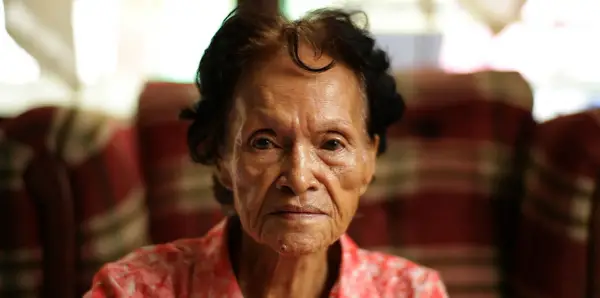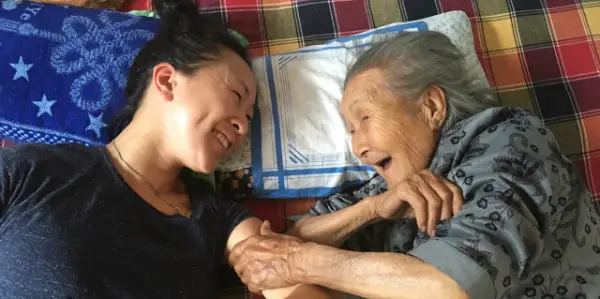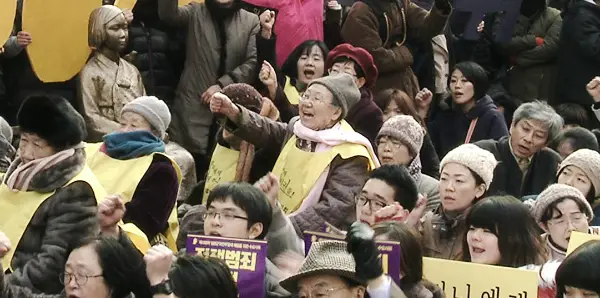THE APOLOGY: An Emotional, Gut-Wrenching Glimpse Into The Atrocities of War

Tara Martinez is a New York-based writer with a passion…
What long-kept secrets lurk between the pages of our history books? This is the question Tiffany Hsiung seeks to answer in The Apology, a documentary that tells the story of three Asian women whose lives have been turned upside down by the trauma of sexual slavery.
During World War II, the Imperial Japanese Army forced over 200,000 women and young girls into sexual slavery. Once referred to as “comfort women”, the women hailed from nations across Asia including China, Korea, and the Philippines. They were held against their will at “comfort stations” where Japanese soldiers raped and then discarded them.
Now, some 70 years later, the surviving women (lovingly and respectfully called Grandma) seek what any person in their circumstances might want: an apology. But the Japanese refuse to acknowledge any fault or even truth in these atrocities. Instead, the government and its avid supporters deny the women the validation, compassion, and sympathy they seek.
The main women in The Apology—Grandma Gil of South Korea, Grandma Cao of China, and Grandma Adela of the Philippines—are just three of the few survivors still alive and well enough to make their voices heard. They protest, hold conferences, and work with other survivors to ensure that the traumatic events of the 1940’s are never forgotten. Yet, at the same time, they’re also fighting years old shame and fear about what lurks in their pasts.
History’s Heartbreak and Controversy
Set on showing the lasting effects of trauma, Hsiung’s film is composed of a series of gut-wrenching scenes. As each of the women recalls her experience in striking detail, the audience is asked to relive the raw emotion of that trauma with her. It’s at once educational and seemingly intrusive, but the women in this film are dead set on showing the world what they’ve fought to overcome.

In one scene, a Japanese politician explains that, in his view, comfort women were “necessary” during the war. We also see counter-protesters calling them “whores” and denying them basic humanity in spite of what they’ve endured. Through this, we come to understand that the women in this film are not speaking out to heal old wounds; they are speaking out to heal wounds that have been reopened time and time again.
To balance the horror of these moments, Hsiung presents us with the truth of who these women are: doting mothers, great friends, and strong community leaders. Unlike their detractors, and in some instances themselves, Hsiung sees these women as wholly human. They have as much, if not more, to offer their loved ones as any one of us might. And it’s the goal of the film to show us that our personal judgments are not always someone else’s truth.
The Unique Pains of Shared Trauma
Although they share similar histories, each of the three women in The Apology is grappling with her own painful experiences. Hsiung does a beautiful job of weaving these women’s stories together and showing the audience that even the shared trauma of sexual slavery can manifest in vastly different ways. In doing this, Hsiung is able to tell a complete that story that spans decades, nations, and generations.

As we learn more about the women, we also learn that they’ve rebuilt their lives around the pain of their pasts. They have become activists, adoptive parents, and keepers of secrets. Who they are as individuals is driven by the one thing that unites them: trauma. From this, we understand that one’s trauma is ever-present, pervasive, and can be passed on from one generation to the next. Only closure can stop the cycle of pain.
The Power and Promise of Closure
Scene after scene, these women show us that there is power in shared experiences, no matter the distance in between. Ultimately what they seek is closure, once and for all. Closure is the key to bridging the gap between past and present; it can lift the burden of pain off of these women’s shoulders and help them live their last years more fully. Even if they don’t see closure in their lifetimes, they still have hope that one day their losses, pains, resentments, and strengths will one day be acknowledged.

The Apology: Conclusion
It’s unfortunate that a film like this will be the first time many have heard of the so-called “comfort women” of World War II. For what they have endured and for the strength they bring to the table even now, these women deserve more than a mention in our history books. They deserve to be acknowledged, honored, and remembered. They deserve an apology.
Were you aware that the Japanese Imperial Army captured and imprisoned so many young women during World War II? Do you think the Japanese government owes them an apology?
The Apology is now available on home video DVD, iTunes, and Amazon Video.
https://www.youtube.com/watch?v=DTtm2HIvwK4Does content like this matter to you?
Become a Member and support film journalism. Unlock access to all of Film Inquiry`s great articles. Join a community of like-minded readers who are passionate about cinema - get access to our private members Network, give back to independent filmmakers, and more.
Tara Martinez is a New York-based writer with a passion for pop culture and a penchant for analysis. She frequently covers film, television, and representations of women in the media.













